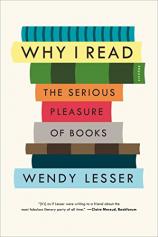Reading Group Guide
Discussion Questions
Why I Read: The Serious Pleasure of Books

1. Why do you read? How do your reasons compare to Wendy Lesser’s?
2. Reflecting on works as diverse as PARADISE LOST and modern thrillers, Lesser vividly describes the influence of well-drawn characters (minor ones as well as those who take center stage) and the difference between “serious novels” and those meant purely for entertainment. Where do you personally draw this literary line? In your home library, how do you distinguish between literature and commercial works?
3. At the end of the second chapter, Lesser observes that the “eerily bridgeable gap between the you and the me of a literary work is also a space between the living and the dead, the imagined and the real, the singular and the collective.” How did her discussion of literary “space” transform your experience of narrative voices?
4. Discussing the concept of novelty, Lesser describes a diverse array of writers --- including Norman Mailer, Roberto Bolaño, Thornton Wilder, and Louise Glück --- who share a mastery of suspending reality or reinventing structures, sometimes through the process of translation. In your opinion, which form (narrative nonfiction, fiction, drama, poetry, essay) best lends itself to novelty? What does it take for a writer to translate an imagined world effectively for you?
5. As Lesser explores questions of authority, what does she reveal about an author’s ability to persuade (particularly in many canonical Russian works) and to build trust as a historical truth-teller?
6. Discuss D. H. Lawrence’s advice, quoted on page 105: “Never trust the artist. Trust the tale.” Are you able to immerse yourself in literature without being distracted by the author’s possible motives or questions about the author’s biography?
7. In “Grandeur and Intimacy,” Lesser considers the notion of Jewish writers who participate in a collective memory, influenced by history while shaping the history that will be lived by their readers. What do you make of the literature of your ancestors? Does it give voice to your identity?
8. Are you drawn to literature that takes you elsewhere, or do you prefer to stay close to home in your reading experiences? Through novelists such as Haruki Murakami and translators such as Alfred Birnbaum, what’s the farthest distance a book has taken you? Like Lesser, are you a connoisseur of translators?
9. On page 176, Lesser invokes Plato’s rejection of poetry in his quest for truth. What is your stance in this debate, especially as a reader in the Information Age? How much reality should a society expect from its literary artists and other storytellers?
10. Are you willing to overlook imperfections in a work of literature? If so, discuss a literary imperfection that has been particularly puzzling, intriguing, or endearing to you.
11. Describe the physical traits of your most treasured books. Are they paperbacks, hardcovers, or ebooks? How does the design influence your imagination? Did you read WHY I READ on hard copy or digitally?
12. Which titles would top your hundred books to read for pleasure?
13. How did WHY I READ enhance your appreciation of the previous books by Wendy Lesser that you have enjoyed?
Why I Read: The Serious Pleasure of Books
- Publication Date: January 13, 2015
- Genres: Literary Criticism, Nonfiction
- Paperback: 240 pages
- Publisher: Picador
- ISBN-10: 1250062098
- ISBN-13: 9781250062093








